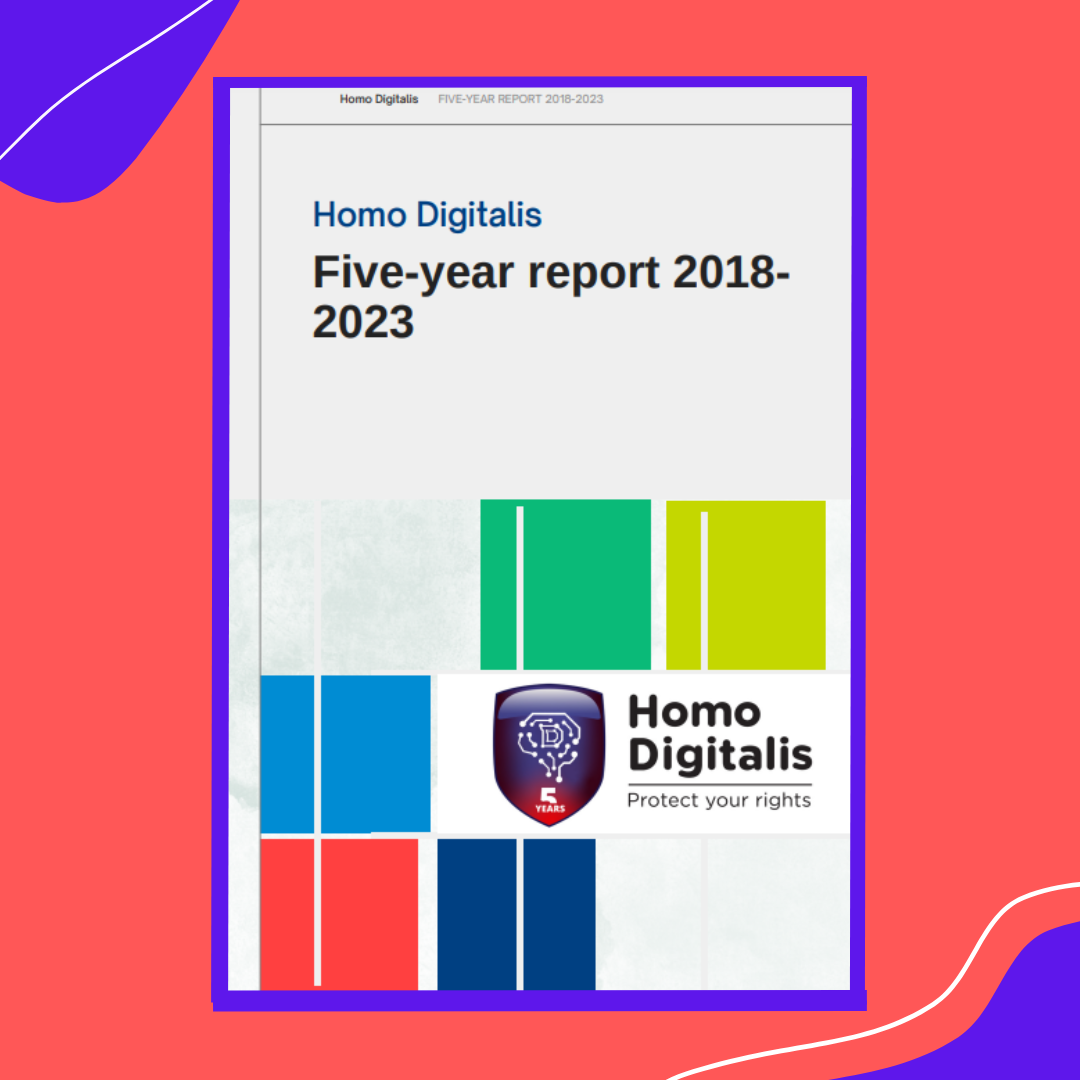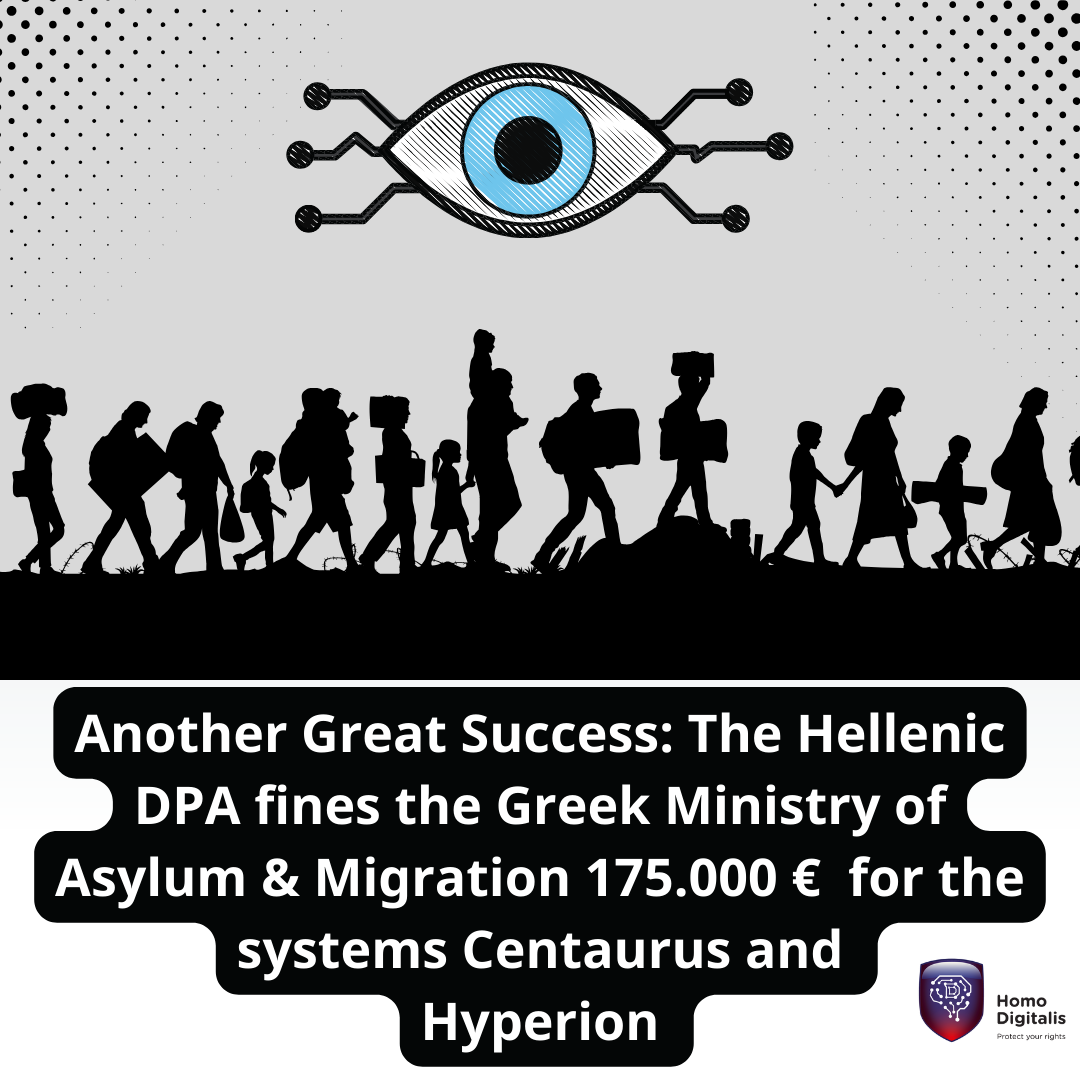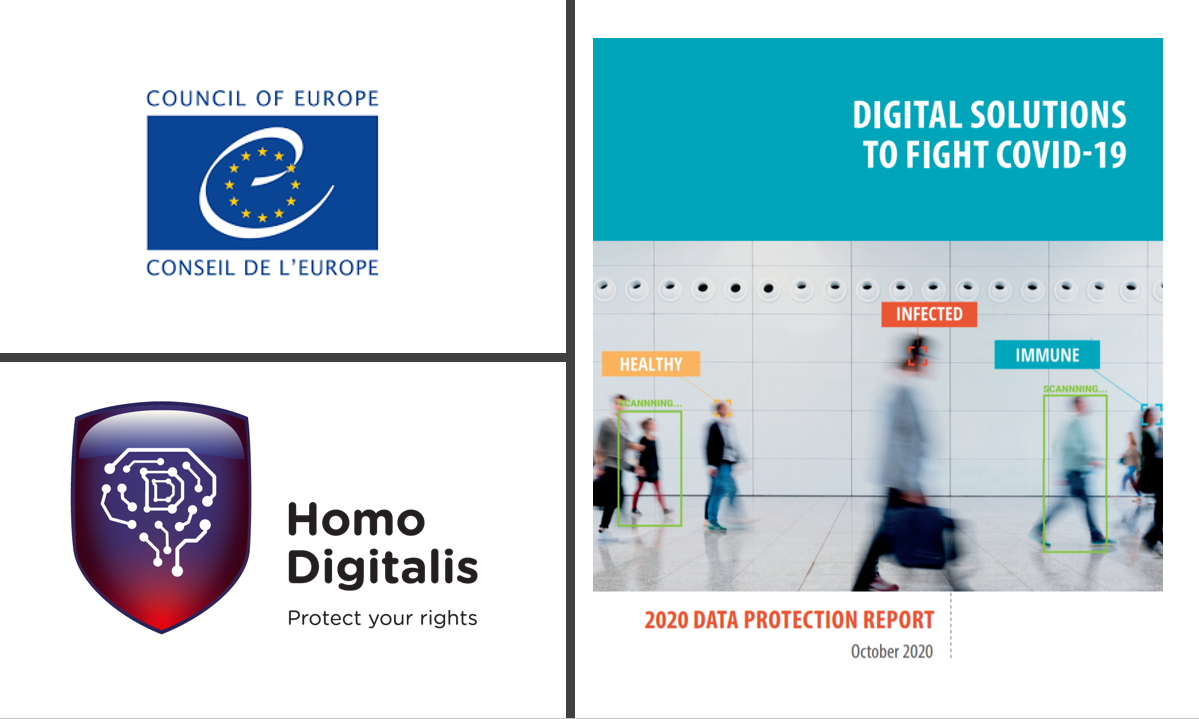We published our successful Report for the five-year period 2018-2023
In 2018, we started with 6 founding members, 25 volunteers and 1,000 euros in the organization’s account. Nobody knew us, but we knew what we wanted to achieve, what gap we were trying to fill, where we wanted to go.Today, we celebrate our 6 years of operation and publish our 5-year report, about everything we have achieved in the period 2018 -2023. The detailed Report contains the beginning of our story, information about the mission, vision and values of Homo Digitalis, and a thorough review of all our major successes by pillar of action, namely a) Awareness, b) Advocay , and c) Legal Actions and Interventions. Finally, in order to enhance transparency about our financial accounts, we have also included all of our Financial Reports for the entire five years period!
You can read our Homo Digitalis’ “Five Year Report 2018-2023” in Greek here or in English here. The report was curated by our Director on Human Rights and AI, Lambrini Gyftokosta.
Looking back we are happy, proud and excited, because until the summer of 2023, we: gained over 130 volunteers, have steadily increased our revenue by 353% every year, filed over 20 complaints with Greek and European authorities, managed to fine Clearview AI €20 million (the largest in Greece), visited more than 30 schools and raised awareness with our actions for more than 3500 students and citizens, gave more than 40 media interviews in Greece and Europe, supported more than 50 joint actions with other Greek and European organisations in the field of digital rights, acquired more than 10.000 followers on social media (LinkedIn, Facebook, Instagram, X), published more than 150 articles of scientific, technical and legal interest on our website with the contribution of our volunteers, became the first and only organisation from Greece to be a member of EDRi, the European Digital Rights Network; and although we started as a purely voluntary organisation, we managed to hire our first employee!
On this journey we were not alone. One of our greatest successes is our collaboration with a large network of universities, organisations, institutions, research centres and all our member volunteers who helped us take our actions one step further!
Looking ahead we are optimistic. We are moving forward dynamically, conquering small and big goals that will bring us even closer to the world we dream of and want to build together!
The Hellenic Data Protection Authority fines the Ministry of Migration and Asylum for the "Centaurus" and "Hyperion" systems with the largest penalty ever imposed to a Greek public body
Two years ago, in February 2022, Homo Digitalis had filed a complaint against the Ministry of Immigration and Asylum for the “Centaurus” and “Hyperion” systems deployed in the reception and accommodation facilities for asylum seekers, in cooperation with the civil society organizations Hellenic League for Human Rights and HIAS Greece, as well as the academic Niovi Vavoula.
Today, the Hellenic Data Protection Authority identified significant GDPR violations in this case by the Ministry of Immigration and Asylum and decided to impose a fine of €175.000 euro – the highest ever imposed against a public body in the country.
The detailed analysis of the GDPR highlights the significant shortcomings that the Ministry of Immigration and Asylum had fallen into in the context of preparing a comprehensive and coherent Data Protection Impact Assessment, and demonstrates the significant violations of the GDPR that have been identified and relate to a large number of subjects who have a real hardship in being able to exercise their rights.
Despite the fact that the DPA remains understaffed, with a reduced budget, facing even the the risk of eviction from its premises, it manages to fulfil its mission and maintain citizens’ trust in the Independent Authorities. It remains to be seen how long the DPA will last if the state does not stand by its side.
Of course, nothing ends here. A high fine does not in itself mean anything. The Ministry of Immigration and Asylum must comply within 3 months with its obligations. However, the decision gives us the strength to continue our actions in the field of border protection in order to protect the rights of vulnerable social groups who are targeted by highly intrusive technologies.
You can read our press release here.
You can read Decision 13/2024 on the Authority’s website here.
We participated at Alan Turing Institute's Workshop on th responsible governance of the use of AI in recruitment and employment’
On the 14th of March, our Director on AI and Human Rights, Lamprini Gyftokosta, participated in an online meeting organised by the Alan Turing Institute “Towards responsible governance of the use of AI in recruitment and employment’. Stakeholders from civil society, government, academia, and industry shared their views on best practices for the use of artificial intelligence (AI) in recruitment and employment, including the development of standards in this field.
Findings from this workshop will help refine the direction and scope of an AI Standards Hub research project led by researchers from The Alan Turing Institute, which will aim to investigate the role of consensus-based standards in governing the use of AI in recruitment and employment across jurisdictional borders.
In Greece, the pilot “AI based strategic workforce planning tool for the public sector” as announced by the Minister of Digital Governance, is an initiative that will apply to more than 700.000 people when completed. As Homo Digitalis underlined during the workshop, harmonised standards in areas like recruitment and employment, even if voluntary, are necessary to create a culture of compliance to the new AI rules. The role of the Greek supervisory authority in enforcing the standards and the law will be paramount, especially since according to the Greek law implementing GDRP, the employees cannot authorise Homo Digitalis to submit a complaint on their behalf without disclosing their names, putting them in an impossible position.
Reference to the actions of Homo Digitalis in the Annual Study of Fundamental Rights Agency (FRA)
On 11 June, the European Union Agency for Fundamental Rights (FRA) published its annual Study on Fundamental Rights.
The study is an excellent analysis of the situation of Fundamental Rights in the EU Member States, as well as the challenges that arise regarding their protection.
Chapter 6 of the Study focuses on the Information Society, Respect for Privacy and Personal Data and reports on the actions of Homo Digitalis.
It is a great honor for our organization to have our name mentioned next to recognized prestigious organizations such as Noyb, Access Now, EDRi, Privacy International, Bits of Freedom!
You can read the FRA Study for free here.
As a reminder, actions of Homo Digitalis were included in the recent study of FRA “Coronavirus pandemic in the EU – Fundamental Rights Implications – Bulletin 2”.
Reference to the activities of Homo Digitalis in a study by the Council of Europe
On 12th October, the Council of Europe published its study on the use of new technologies by its Member States in order to tackle the various challenges that came up during the pandemic.
On page 11 of the study, the Council of Europe is referring to the activities of our organisation as regards the use of drones by the Greek Police.
It is a great honor and joy for our organisation, the fact that our activities have drawn the attention of international organisations such as the Council of Europe.
You may read the study here.
We would like to remind you that direct reference to the activities of our organisation have been made in the past from different well-known organisations in the field of human rights, such as the two studies of the Fundamental Rights Agency (FRA).
The actions of Homo Digitalis in “Kathimerini” Newspaper
It is a great pleasure for our organization that our actions are mentioned in a recent article published in the newspaper “Kathimerini”. Journalist Ioannis Papadopoulos with his article “Border controls with advanced digital systems” focuses on European research programs in the field of border management in Greece and refers to our requests for access to information that we had sent to the Research Executive Agency (REA) of the European Commission regarding seven (7) research programs concerning the use of new technologies in the fields of migration and policing in Greece and the relevant answers we received.
We warmly thank Ioannis Papadopoulos for his interest in the actions of Homo Digitalis.
(Links are available only in Greek)
Deploying DP3T in the real world - how ready are we?
Undoubtably, there has been a big debate in the last couple of months around the topic of contact tracing apps. This debate focuses mainly on the choice of either centralized or decentralized architecture, in order to minimize the processing of personal data and make sure that privacy of participants is protected.
The teams still remaining in the PEPP-PT consortium are perhaps the main representatives of the centralized approach, having published the specifications of ROBERT on April 18, and of NTK the day after. On the other side, the teams in the DP3T consortium criticize centralized systems, pointing out that they can be turned into mass surveillance instruments of governments, and they emphasize on the development of the decentralized model DP3T. However, there have been several studies criticizing the privacy protection offered by decentralized models as well. In the decentralized approaches we should also include the protocol from Apple and Google, which will be soon in the OS of our mobile phones.
Understandably, all these discussions have created a lot of confusion to non-experts. In an effort to clarify some of the issues, we contacted Dr. Apostolos Pyrgelis*, Post-Doctoral researcher in EPFL and member of the DP3T team. In this article we publish his answers on our questions around the DP3T protocol, focusing mainly on how close we are to real-life deployment and the Greek reality. We would like to thank Dr. Apostolos Pyrgelis for his availability.
Also, we would like to thank our member Dr. Ioannis Krontiris** for reaching out to Dr. Apostolos Pyrgelis and the DP3T team and for facilitating this interview. We will soon publish this interview translated in Greek, as well.
1) What is the relation between Google/Apple platform (GACT API) and DP-3T? Is the plan to deploy DP-3T on top of the GACT platform or does it have its own independent access to the OS (e.g. Bluetooth hardware, storage of keys, etc.)?
The DP-3T project is formed by a group of international researchers whose interest is to ensure that proximity tracing technologies will not violate human rights key to our democratic society. It started independently of Google and Apple and remains independent of them. The DP-3T project is constantly making new proposals and is publishing positions to inform the discussion around proximity tracing. These positions may be different from these companies’ strategies or points of view.
The Google/Apple joint system design (i.e., the GACT API) aims at enabling interoperability for decentralized proximity tracing applications across iOS and Android mobile devices. This is particularly important for the success of contact tracing apps. To this end, the plan is to deploy the DP-3T protocol on top of the GACT platform and the DP-3T project has access to a code base for iOS and Android that is functional prior to the corresponding OS upgrades. Currently, DP-3T project members are working in close collaboration with Google/Apple engineers to provide open-source support for their API, since we expect that the majority of national applications will be built on top of it.
2) Broadcasting continuously Bluetooth beacons can be used to track people around, since one could try to link these messages together and create traces. What countermeasures do you take against this?
In the DP-3T system, the users’ mobile devices broadcast to their vicinity (random looking) ephemeral identifiers via Bluetooth Low Energy (BLE). To prevent user tracking via these broadcasts, the ephemeral identifiers are changing regularly (e.g., every 15 min). We here note that this is a shared feature among DP-3T and the GACT platform.
3) What is your experience and lessons learnt from testing the app with real users? How many manual tracers did you use for these tests?
We here clarify that we did not perform any testing of the application with real users or contact tracers. We only performed field experiments in known scenarios for which we could collect ground truth that would enable us to evaluate the accuracy of using BLE beacons for distance estimation among individuals, in various settings. A brief overview of these experiments can be found on the following video. We are currently processing the results of the field experiments aiming to identify the appropriate configurations and parameters for reliable distance estimation using BLE.
4) What would cause a false positive or a false negative in the DP-3T system? Consider for example thousands of people stuck in traffic in a busy city like Athens. That means I am in my car stopped for several minutes next to someone in their own car who’s infected. What existing measures are being considered to mitigate this class of problems?
First, we remind that traditional, person-based contact tracing has a lot of false positives since the majority of users that are exposed to infected others, do not present symptoms and do not get themselves infected. Similarly, it also has false negatives since infected users are unable to recall all the people that they met with in the recent past or identify strangers that they encountered in a bus, a shop, etc.
It is important to distinguish the above false positives/negatives from those that are related to contact discovery, i.e., the fact that two users were exposed to each other in close distance and for a specific amount of time (as defined by the public health authorities), when it comes to digital contact tracing. In the DP-3T system, the contact discovery process is realized via transmissions over Bluetooth, whose wireless broadcast nature is inherently affected by factors such as physical objects, radio interference, weather conditions, etc. This might lead to contact discovery false positives, e.g., if a contact is registered even though there is clear physical separation, such as a wall, between the users, and false negatives, e.g., if an actual contact is missed due to radio interference. The DP-3T team is currently performing extensive measurements to better understand the performance of Bluetooth communications for distance estimation in various settings and parameterize the application in a very conservative manner such that false positives/negatives are limited. We have not explicitly tested the traffic jam scenario, but to account for such situations the app will allow the users themselves to temporarily disable the contact discovery process.
5) Which factors are affected while deployment of DP-3T is scaled up? Would the protocol scale to the magnitude of millions of users?
The DP-3T protocol is designed in such a way that it easily scales to countries with millions of users without compromising their privacy. User devices need to download from the backend server minimal information per day (a few MBs) — which makes DP-3T also scalable to countries with poor broadband — and require very little time (a few secs) to generate their ephemeral keys and compute the infection risk of their owner.
6) Have you been approached by the Greek authorities regarding deployment of DP-3T in Greece? Do you have any indication in which direction Greece wants to take with respect to contact tracing apps?
We have not been approached by the Greek authorities regarding deployment of DP-3T in their country. As such, we do not have any information about the Greek plans with respect to contact tracing applications.
7) Assuming that Greece opts in for a decentralised solution in the future (DP-3T or other), what information would Greece have to share with other countries regarding visitors and tourists in order to achieve interoperability between decentralised solutions across countries? Would that reveal travel plans of people back to their homelands?
Interoperability of contact tracing systems across countries is a very important factor for their success — especially, in cases of free movement, such as the EU, where people travel daily to other countries for business, leisure, etc. The DP-3T project envisions interoperability between decentralized solutions across countries and is currently collaborating with designers and engineers from various countries to address its technical challenges. In one of the proposed interoperability solutions, users would have to configure their application to receive notifications from the countries that they travel into. Moreover, the homeland backend servers of the infected users would have to forward the relevant data to the backends of other countries that these users have visited. While this would reveal information about users’ travel patterns to their homelands, we believe that this is acceptable for the international success of contact tracing.
8) A major issue for contact tracing apps is persuading people to actually use them. Do you have any indication what is the minimum necessary penetration of the app to the population in order for the app to be effective? Is a high degree of case identification within a population required and does this translate to widespread testing?
Indeed, the success of contact tracing apps depends on users’ adoption and this is why we believe that it is of paramount importance to ensure them that their privacy is protected. While such a large scale deployment has never been performed before it is not clear what is the minimum necessary penetration of the app to the population for it to be successful. However, epidemiologists believe that any percentage of app usage will contribute to the pandemic mitigation efforts. To this end, the DP-3T project is hopeful that the app will have impact for “proximity communities”, e.g., commuters, co-workers, students, that have a suitable density of deployment. Finally, we remark that contact tracing apps should be complementary (and absolutely not a replacement) to traditional interview-based contact tracing and should be combined with public health infection testing policies. What really matters, at the end of the day, is to bring and maintain the virus transmission rate below 1.
* Dr. Apostolos Pyrgelis is a Post-Doctoral researcher at the Laboratory for Data Security of École Polytechnique Fédérale de Lausanne. His research interests include privacy-enhancing technologies and applied cryptography, and enjoys studying problems at the intersection of big data analytics and security or privacy. He received his PhD from University College London and his BSc and MSc from the University of Patras in Greece.
**Dr. Ioannis Krontiris holds a Ph.D. Degree in Computer Science from University of Mannheim in Germany, and a M.Sc. Degree in Information Technology from Carnegie Mellon University in USA, while he is also a graduate from the School of Electrical and Computer Engineering of the Technical University of Crete. He is currently working as a Privacy Engineer at the European Research Center of Huawei in Munich, Germany.
Homo Digitalis becomes full EDRi member
Today Homo Digitalis became full member of European Digital Rights (EDRi), the most prominent digital rights organizations coalition in the world!
We are the first Greek organization to make it and we are extremely happy to be representing our country.
Homo Digitalis had been an observer-member to EDRi since November 2018. Our actions for digital rights protection in both Greek and European level attracted the interest of champion digital rights organizations.
We warmly thank all our members for their contribution to our work during these years!
D3, the first Portuguese digital rights organization, also became full member on the same day.








